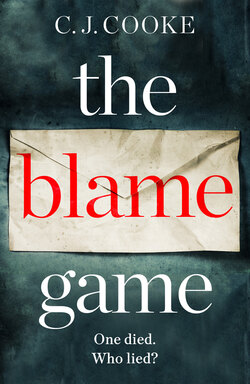Читать книгу The Blame Game - C.J. Cooke - Страница 11
1 Helen 30th August 2017
ОглавлениеI think I might be dead.
The scene in front of me looks like sea fret creeping over wasteland, closing in like a fist. A smell, too – sewage and sweat. There’s a flickering light, like someone bringing a torch towards the mist, and it grows so bright that I realise it’s my eyelids beginning to creak open, like two slabs of concrete breaking apart. Wake up! I shout in my head. Wake up!
Painful brightness. I can make out a ceiling with yellow stains and broken plasterboard, and a ceiling fan that spins limply. I try to lift my head. It takes enormous effort just to raise it an inch, as though an anvil is strapped to it. Where am I? My denim shorts and T-shirt are torn and caked in mud. I’m on a bed wearing one sandal. My other foot is twice its normal size, the blue nail polish that Saskia applied to my toes peeking through dried blood. I wiggle my toes, then my fingers.
I can feel my limbs. Good.
A nurse is busy replacing something at the foot of the bed. A urine drainage bag. A sharp tug at my side alerts me to the fact that the bag belongs to me.
‘Excuse me?’ I say. My voice is hoarse, no more than a croak.
The foreign chatter elsewhere in the room makes me think that the nurse might not speak English.
‘Sorry, but …? Excuse me? Can you tell me why I’m here?’
Even now, when I’ve no clue where I am or why, I’m apologising. Michael always said I apologise too much. I apologised all the way through both labours for screaming the place down.
A man arrives and consults with the nurse, both of them giving me worried looks as I try to sit up. He’s a doctor in plain clothes: a black polo shirt and jeans, a stethoscope and lanyard announcing his purpose. To my left is a window with a ripped insect net, and for some reason I want to go to it. I need to find something, or someone. ‘You must be careful,’ the doctor warns me in a thick Belizean accent. ‘Your head is very damaged.’
I reach a hand to my head and feel the padding of a dressing on my left temple. The skin around my left eye feels swollen and sore to the touch. I remember now. I remember what I was searching for.
‘Do you know where my children are?’ I ask him, the realisation that they’re nowhere to be seen making my heartbeat start to gallop.
The room lists like we’re rolling on high seas. The doctor insists that I lie down but I’m nauseous with fear. Where are Saskia and Reuben? Why aren’t they here?
‘This is you?’ The doctor holds a shape in front of me. My passport. I stare at it through tears. My face stares back blankly and my name is there. Helen Rachel Pengilly.
‘Yes. Look, I have two children, a son and daughter. Where are they?’
The doctor gives the nurse another deep look instead of answering me. Please don’t say they’re dead, I beg you. Don’t say it.
I begin to hyperventilate, my heart clanging like an alarm in my ears. And right as blackness reaches up to claim me, a sharp odour tugs me back into the room. Smelling salts. A cup of water materialises in front of me. The water’s got bits of dirt in it. Someone tells me to drink, and I do, because instinct tells me that perhaps if I obey they’ll tell me Saskia and Reuben are alive. Give me arsenic, a pint of oil. I’ll drink it. Just say they’re OK.
Another nurse brings a rickety wheelchair. She and the doctor help me off the bed and manoeuvre the drip-stand as I lower, my muscles trembling, on to the roasting hot seat-pad. Then we squeak through the ward towards a narrow, dimly lit corridor.
